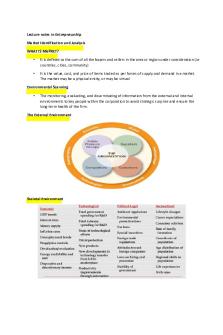Cobmeco Market Analysis - Market Equilibrium PDF

| Title | Cobmeco Market Analysis - Market Equilibrium |
|---|---|
| Course | Managerial Economics |
| Institution | De La Salle University |
| Pages | 1 |
| File Size | 107 KB |
| File Type | |
| Total Downloads | 252 |
| Total Views | 690 |
Summary
COBMECO 2 nd Term, AY 2019-Reviewer: market analysisShort essay questions (market analysis)About market equilibrium. Do you agree that market equilibrium can be considered best or optimal? Answer yes or nobut justify your answer. Do you agree that a market equilibrium is necessarily fair or equitabl...
Description
COBMECO Reviewer: market analysis
2nd Term, AY 2019-20
Short essay questions (market analysis) About market equilibrium. Do you agree that market equilibrium can be considered best or optimal? Answer yes or no but justify your answer. Do you agree that a market equilibrium is necessarily fair or equitable? Answer yes or no but justify your answer. Do you agree that a market at equilibrium maximizes the magnitude or size of both consumer and producer surpluses? Answer yes or no but justify your answer. A: I believe that market at equilibrium can be considered best and optimal since the quantity demanded is above the quantity supplied for every unit before the equilibrium point. This means that consumer demand is greater than the supply of goods that sellers are willing to produce. Each of these actors gains from the market at equilibrium. However, I don’t necessarily think it’s fair or equitable because although it is stable, the output will sometimes still remain to be unaffordable regardless of the demand that customers have. A percentage of the population still won’t be able to purchase the product. Yes, I believe market at equilibrium maximizes the size of the total surplus because it puts both actors at an equal point in the market where their surpluses are equal or fair to one another. If a shortage or surplus occur, not only will it affect the equilibrium price, it will also reduce consumer and producer surpluses because having different price points will have corresponding effects on the demand and supply of the consumer. Thus, having the price of a good at the market equilibrium maximizes the consumer and producer surpluses. A desirable objective of an economic system is to maximize the well-being of society. Do free markets do that? To answer that question, buyers must benefit from what they buy and sellers must benefit from what they sell. When people buy something, they generally pay less than what they were willing to pay for the good or service: the difference between the willingness-to-pay price and the market price is the consumer surplus. Likewise, sellers can sell a product at a higher price than their economic cost to produce a product: the difference between the economic cost and the market price is the producer surplus. Consumer Surplus = Willingness to Pay Price – Market Price Producer Surplus = Market Selling Price – Economic Cost
If the product price is higher than the market price, then the producer surplus increases, but only at the expense
of the consumer surplus. If the price is lower than the market price, then consumers enjoy increased consumer surplus, but only at the expense of the producers. Of course, this assumes that the buyers will buy the entire quantity at the higher price or that producers will produce the quantity demanded at the lower prices. However, a price higher than the market price will lead to a surplus, because the price is higher than what many consumers are willing to pay, and if the price is below the market price, then shortages will be created, because at lower prices, producers are only willing to produce a quantity that is less than demand. So, in actuality, shortages and surpluses will reduce the total surplus. Therefore, total surplus is maximized when the price equals the market equilibrium price....
Similar Free PDFs

Asset-Market Equilibrium
- 29 Pages

Market Equilibrium and Policy
- 1 Pages

Market Equilibrium (Mind Map)
- 1 Pages

Zara market analysis
- 31 Pages

Assignment 1 Market Analysis
- 7 Pages

Nykaa market analysis
- 8 Pages

Febreeze Market Analysis original
- 27 Pages

Allview - Market Analysis
- 15 Pages

Wendy\'S Market Analysis final
- 14 Pages

Goblin Market Analysis
- 3 Pages

Market & Market Failure
- 2 Pages

Market Leader or Market Led
- 2 Pages

Hermes: Market and Business Analysis
- 16 Pages
Popular Institutions
- Tinajero National High School - Annex
- Politeknik Caltex Riau
- Yokohama City University
- SGT University
- University of Al-Qadisiyah
- Divine Word College of Vigan
- Techniek College Rotterdam
- Universidade de Santiago
- Universiti Teknologi MARA Cawangan Johor Kampus Pasir Gudang
- Poltekkes Kemenkes Yogyakarta
- Baguio City National High School
- Colegio san marcos
- preparatoria uno
- Centro de Bachillerato Tecnológico Industrial y de Servicios No. 107
- Dalian Maritime University
- Quang Trung Secondary School
- Colegio Tecnológico en Informática
- Corporación Regional de Educación Superior
- Grupo CEDVA
- Dar Al Uloom University
- Centro de Estudios Preuniversitarios de la Universidad Nacional de Ingeniería
- 上智大学
- Aakash International School, Nuna Majara
- San Felipe Neri Catholic School
- Kang Chiao International School - New Taipei City
- Misamis Occidental National High School
- Institución Educativa Escuela Normal Juan Ladrilleros
- Kolehiyo ng Pantukan
- Batanes State College
- Instituto Continental
- Sekolah Menengah Kejuruan Kesehatan Kaltara (Tarakan)
- Colegio de La Inmaculada Concepcion - Cebu


